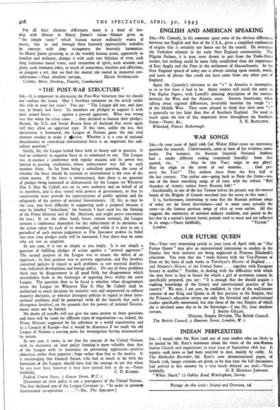THE POST-WAR STRUCTURE "
SIR,—It is important in discussing the Post-War Structure that we should not confuse the issues. May I therefore comment on the article under this title in your last issue? You say: "The League did not, and does not, in theory lack force. Its members are pledged to support it with their armed forces . . . against a proved aggressor. What was wrong
was that when the crisis came . they declined to honour their pledges. Britain, the U.S. and Soviet Russia have all declared that never again will they allow an aggressor rope. If this• time, unlike the last, that declaration is honoured, the League of Nations gains the one vital element needed to make it *ctive. Whether it is a case of national detachments or centralised international force is an important but sub- sidiary question."
Surely, Sir, the League lacked force both in theory and in practice. It had no authority to organise force or to command its use. The League was in essence a conference with regular sessions and its power was limited to passing resolutions, whose enforcement was left to each member State. So far from being a subsidiary question, the issue of whether the force should be national or international is the crux of the whole matter. If the force is international, then there is no question of pledges being honoured or dishonoured, for the League (or Whatever Else It May Be Called) acts on its own authority and on behalf of all its members, and is thus vested with powers of government, so that its constitution must provide for representation of public opinion and for safeguards of the powers of national Governments. (If, Sir, as may be the case, you have difficulty in supporting such a proposal because it may be labelled " federalism," the formula I have used has the blessing of the Prime Minister and of Mr. Morrison, and might prove convenient for you.) If, on the other hand, forces remain national, the League remains a conference dependent for the enforcement of its decisions on the action taken by each of its members, and while it is nice to see a periodical of such mature judgement as The Spectator profess its belief that next time pledges really will be honoured, I fear there may be some who are not so sanguine.
In any case, it is not so simple as you imply. It is not simply a question of fulfilling pledges of action against a "proved aggressor." The second purpose of the League was to ensure the defeat of an aggressor ; its first purpose was to prevent aggression, and this involves concerted policies in regard to such problems as raw material distribu- tion, industrial development and foreign policy. On any of these problems there may be disagreement in all good faith, but disagreement which nevertheless leads to the formation of opposing blocs within the same League. The question then to be faced is whether when disagreement arises the League (or Whatever Else It May Be Called) shall be authorised to reach decisions by majority vote and empowered to enforce majority decisions, or whether divergent policies in regard to these inter- national problems shall be permitted (with all the hazards that such a divergence involves), on the grounds that the powers of national Govern- ments must not be limited.
No doubt all nations will not give the same answer to these questions and there will be room for different types of organisation—as, indeed, the Prime Minister suggested by his reference to a world organisation and to a Council of Europe—but it would be disastrous if we made the old League of Nations a starting point for investigation having misconceived its nature.
In any case, it seems to me that the concept of the United Nations with its insistence on joint policy forming is more valuable than that of the League with its insistence on preventing aggression—positive objectives rather than negative ; hope rather than fear as the motive. It is encouraging that General Smuts, who had so much to do with the formation of the League, should have had the courage to say this when he was over here, however it may have pained him to do so.—Yours
faithfully, C. D. KIMBER. Federal Union News, 3 Gower Street, W.C. r.
[Insistence on joint policy is not a prerogative of the United Nations. The first declared aim of the League Covenant is : " In order to promote international co-operation . . . ."—En., The Spectator.)






















 Previous page
Previous page